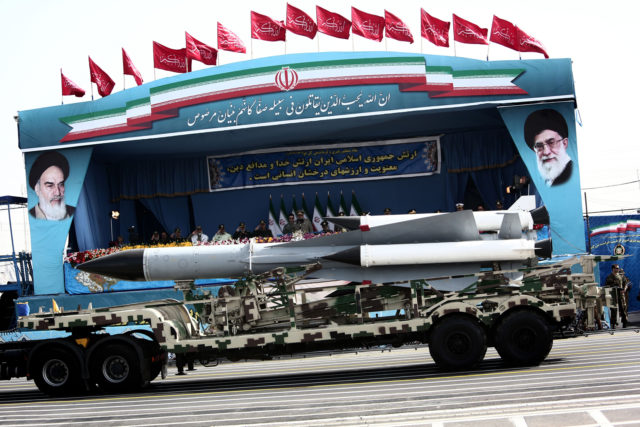On April 18, the Trump administration notified Congress that Iran is complying with the 2015 nuclear weapons agreement it negotiated with the United States, Great Britain, France, Germany, Russia and China. But the letter from Secretary of State Rex Tillerson to U.S. House Speaker Paul Ryan (R-Wis.) suggested the White House could change its mind by the time the next 90-day notification is due in mid-July.
According to the Wall Street Journal, Secretary Tillerson said President Donald Trump has directed the National Security Council to lead an interagency review to “evaluate whether suspension of [economic] sanctions related to Iran” as part of the nuclear deal is in American interests. Iran’s continued activity as “a leading state sponsor of terror through many platforms and methods” remains a key concern.
The Voice of America added that Tillerson said the government-wide review must address all threats posed by Iran since “it’s clear there are many.” These include support for the regime of President Bashar al-Assad in Syria’s civil wars, long-standing hostility to Israel and “one of the world’s worst human rights records.” The Trump administration already has imposed new economic sanctions in response to Iran’s continued ballistic missile program.
The nuclear deal with Iran “represents the same failed approach of the past that brought us to the current imminent threat we face from North Korea,” Tillerson stated. With future notifications to Congress in mind, the secretary said the White House has no intention of “passing that buck to a future administration.”
Meanwhile, Iran stretches, manipulates and at times ignores provisions of the 2015 nuclear deal, called the Joint Comprehensive Plan of Action (JCPOA). The JCPOA was intended to limit the Islamic Republic’s presumed drive for nuclear weapons. Appearing before the House Oversight and Government Reform Committee’s national security subcommittee on April 5, David Albright testified that “the deal’s implementation under the Obama administration was too permissive and tolerant of Iran’s violations … its exploitation of loopholes and its avoidance of critical verification requirements.”
Deal must be strengthened
Albright, a physicist and founder and president of the Institute for Science and International Security (wryly known as “the good ISIS”), said the JCPOA “needs to be implemented more effectively and its nuclear conditions strengthened and better verified.” His testimony went virtually unreported.
Albright said he hoped the White House would continue to implement the deal. “However, that does not mean the Trump administration should continue the Obama administration’s … avoidance of dealing with the JCPOA’s shortcomings.”
Examples of the agreement’s flaws, according to the ISIS president, include:
- “Excessive secrecy surrounding implementation of the deal and its associated parallel agreements”;
- “Iran’s on-going refusal to allow the IAEA [International Atomic Energy Agency, charged with inspecting Iranian compliance with the JCPOA] to access military sites and interview personnel.” Access remains critical to confirming nuclear weapons development bans in the JCPOA; without it the deal “remains largely unverified by the IAEA on the nuclear weapons development side”;
- A dramatic decrease “in quantity and quality” of reporting by the International Atomic Energy Agency on developments inside Iran;
- Continued testing of ballistic missiles—whose primary purpose is to carry nuclear warheads—“inconsistent with or in violation of U.N. Security Council Resolution 2231” adopted to reinforce the JCPOA; and
- Known violations by Iran of limits on research and development of its centrifuges used in nuclear fuel enrichment.
Of Iran’s inhibiting IAEA inspections, Albright asserted that by agreeing to an “unrealistic deadline,” the Obama administration and the other five countries negotiating the JCPOA with Iran essentially gave away the agency’s “ability to resolve its concerns about Iran’s past nuclear weapons work” or possible military dimensions (PMD) of the country’s nuclear programs.
“To this day, the IAEA has not been able to state that Iran has addressed its concerns and questions about past nuclear weapons activities or to determine the exact status of what Iran achieved and may have hidden away,” Albright maintained. The mullahs’ “denials of access would not be tolerated by the IAEA or international community in other nonnuclear weapons states with comprehensive safeguards agreements. Denial of access would be rightly called a major violation,” he said in his written testimony.
Agreement’s wording ‘favors Iranian interpretations’
“The Obama administration decided to ignore Iran’s actual and potential obstacles” in this regard, he added. The Trump administration “should no longer ignore Iran’s intransigence on this critical issue.”
John Bolton, former U.S. ambassador to the United Nations, and Paula A. DeSutter, former assistant secretary of State, writing in The Washington Times, charged, “in critical respects, President Obama negotiated the JCPOA to be inherently unverifiable. The vaguely written and internally contradictory text of the agreement, with language invariably favorable to Iranian interpretations that would subvert its ostensible intent, is the opposite of how arms agreements should be written.”
Bolton and DeSutter added, “the agreement expresses many Iranian commitments as being voluntary, based on Iran’s ‘plans.’”
The American Enterprise Institute’s Michael Rubin charged that the “it increasingly looks like history will judge the Joint Comprehensive Plan of Action (JCPOA) as being as bad or worse than the 1994 Agreed Framework with North Korea.” Writing for Commentary magazine online, Rubin claimed that the Iran nuclear deal “completely reversed the precedent established by the dismantling of South Africa and Libya’s nuclear programs and left Iran with more centrifuges than Pakistan had when it built not a nuclear weapon but an entire arsenal.”
According to Albright, “if this deal is to succeed, let alone survive, the Trump administration will need to take aggressive actions to adequately enforce the JCPOA and U.N. Security Council Resolution 2231.” Bolton and DeSutter seconded that view, writing that the White House “should urgently address” the JCPOA’s “critical deficiency” in how the United States monitors compliance with it.
Will the executive branch’s report to Congress in July reveal a shift? The Wall Street Journal said Tillerson’s April letter “represents the strongest language from the Trump administration that it might not support the deal in the future.”
Stay tuned.






